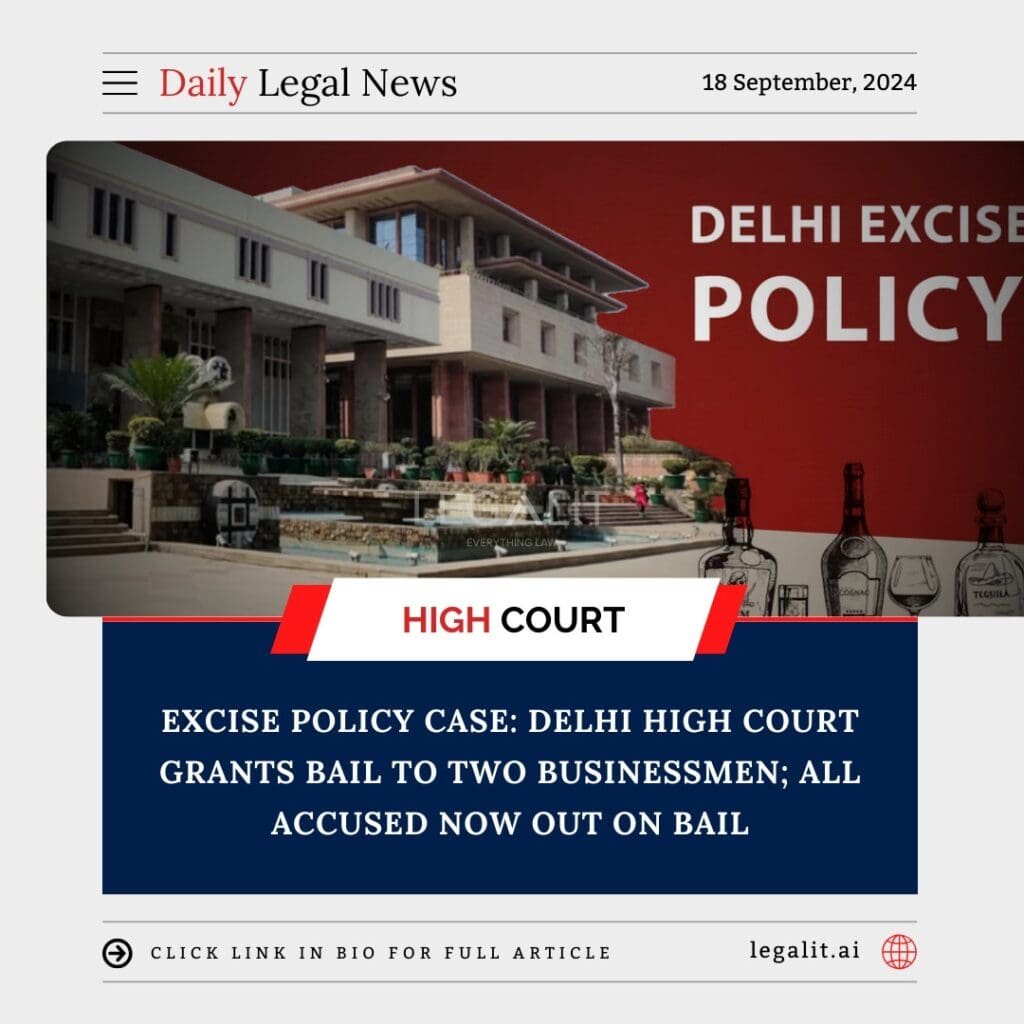
In a significant development in the Delhi Excise Policy case, the Delhi High Court has granted bail to two businessmen who were among the accused in the case. With this order, all individuals implicated in the case are now out on bail, marking a crucial moment in the ongoing legal proceedings.
Background of the Excise Policy Case
The Delhi Excise Policy case revolves around allegations of corruption and irregularities in the implementation of the capital’s 2021-2022 excise policy, which was intended to boost revenue by liberalizing the liquor trade. Several top officials, including politicians, businessmen, and bureaucrats, were accused of being involved in a nexus to benefit private liquor vendors and generate illicit profits. The case was investigated by both the Central Bureau of Investigation (CBI) and the Enforcement Directorate (ED), with multiple arrests made under charges of corruption, money laundering, and conspiracy.
The probe attracted widespread attention as it implicated prominent political figures and highlighted potential flaws in the excise policy’s execution.
High Court’s Bail Orders
The Delhi High Court’s decision to grant bail to the two businessmen is viewed as a major step in the judicial process. The businessmen, along with several others, had been in custody for months as the investigation and legal proceedings unfolded.
- Reason for Bail: In its order, the High Court cited a lack of sufficient evidence to justify continued detention, noting that keeping the accused in custody without a trial date would be unjust. The court emphasized the principle that bail, rather than jail, should be the norm unless there is a clear risk of the accused tampering with evidence or fleeing.
- Conditions of Bail: As with others who were granted bail earlier in the case, the businessmen have been released under strict conditions, including the requirement to cooperate with the investigation, not leave the country without court approval, and report regularly to investigating agencies. These conditions are designed to prevent any interference with ongoing inquiries.
- All Accused Now on Bail: With this latest ruling, all individuals arrested in connection with the excise policy case are now out on bail. This includes several high-profile figures, indicating that the case will now primarily proceed with the accused out of custody, focusing on trial preparation and legal arguments.
Impact on the Investigation and Legal Proceedings
- Prosecution’s Challenge: The grant of bail to all accused poses a challenge to the prosecution, which must now proceed without the leverage of custody to extract information or secure cooperation. The onus is on the CBI and ED to produce strong evidence in court to support their allegations of corruption and financial misappropriation.
- Focus on Trial: The focus now shifts to the trial phase, where the prosecution will need to prove its case before the court. This may involve calling key witnesses, presenting documentary evidence, and detailing the alleged money trails and decision-making processes involved in the excise policy.
- Public and Political Attention: Given the political sensitivity of the case, the bail orders have drawn significant public and media attention. While the accused are no longer in custody, they remain under scrutiny as the case unfolds in court. The trial’s outcome could have broader implications for governance and policy formulation in Delhi.
Broader Legal and Political Implications
- Legal Precedent for Bail: The court’s decision reinforces the legal principle that bail should not be denied unless there are strong reasons to justify continued detention. This decision could serve as a precedent in future cases involving complex economic and political crimes, where the balance between pre-trial detention and individual rights becomes critical.
- Political Repercussions: The case has been politically charged from the beginning, with accusations of misuse of power and systemic corruption within the government machinery. The bail orders may alter the political narrative surrounding the case, although the final judgment will be the decisive factor.
- Policy and Governance Lessons: The excise policy case has prompted discussions about how public policies are formulated and implemented. Critics have pointed to the risks of policies that create opportunities for private gain at the public’s expense. The trial’s proceedings may shed more light on the specifics of how the excise policy was structured and executed, offering lessons for future governance.
Conclusion
The Delhi High Court’s decision to grant bail to the last two businessmen in the excise policy case marks a pivotal moment in the ongoing legal saga. With all accused now out on bail, the focus will shift to the courtroom, where the trial will determine the legal responsibilities of those involved. The case continues to draw public attention due to its political overtones and the broader issues it raises about policy execution and governance in the capital. As the legal proceedings move forward, all eyes will be on the evidence presented and the eventual verdict.